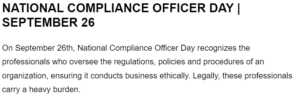September 26th, National Compliance Officer Day
Today we celebrate National Compliance Officer Day by recognizing the efforts of all compliance officers around the world. A compliance officer is responsible for a wide variety of duties, including developing and implementing policies and programs that prevent issues of noncompliance. They can also be known as a compliance manager, chief compliance officer (CCO), or corporate compliance officer. A common misconception is that compliance officers have power over other employees. However, they are not supervisors and cannot punish or hire employees; instead they identify risk factors that can result in infractions and report their findings to specific authority figures. There are many different kinds of organizations that employ compliance officers, including hospitals and insurance companies as well as public organizations like colleges and universities; although many organizations now use automated software to handle much of their work, it is still important for humans to oversee the process and ensure it is operating efficiently! If you were hoping to become a compliance officer at some point in the future but do not know where to start there are plenty of resources available online to get you started on your journey!
Today we celebrate National Compliance Officer Day by recognizing the efforts of all compliance officers around the world.
We at ComplianceScorecard.com are proud to celebrate National Compliance Officer Day by recognizing the many efforts of all compliance officers around the world.
In case you're not sure what a compliance officer is, they are individuals responsible for ensuring that their company's products and services meet regulatory standards in whatever jurisdiction they operate in. It's no small task: without them, we wouldn't have safe cars or clean drinking water, and cybersecurity managed risk.
This year, celebrate this momentous occasion by sending a card to your favorite compliance officer or attending one of several events held across the country (including one hosted by ComplianceScorecard.com).
A compliance officer is responsible for a wide variety of duties, including developing and implementing policies and programs that prevent issues of noncompliance.
A compliance officer is responsible for a wide variety of duties, including developing and implementing policies and programs that prevent issues of noncompliance. These policies and programs can include things like training, background checks, and employee handbooks. They must also report any violations to the appropriate authority figures.
In addition to these standard responsibilities, compliance officers may be tasked with additional responsibilities depending on the type of organization they work for. For example, some companies may require their compliance officers to ensure that all employees are aware of proper company dress code standards or adhere to strict restrictions on using social media while at work
Covering your compliance program one policy at a time!Compliance officers can also be known as a compliance manager, chief compliance officer (CCO), or corporate compliance officer.
A compliance officer is responsible for ensuring that their company is in compliance with laws and regulations. They are not supervisors and cannot punish or hire employees. They can be known as a compliance manager, chief compliance officer (CCO), or corporate compliance officer.
A common misconception is that compliance officers have power over other employees. However, they are not supervisors and cannot punish or hire employees.
A common misconception is that compliance officers have power over other employees. However, they are not supervisors and cannot punish or hire employees. They do not have the day-to-day responsibilities of supervising others, nor are they responsible for the day-to-day operations of the organization. Instead, compliance officers focus on identifying risk factors within their organizations and reporting these findings to specific authority figures so that appropriate action may be taken.
Compliance officers do not investigate violations, but instead identify risk factors that can result in infractions and report their findings to specific authority figures.
A compliance officer's job is to identify and report what they believe are risk factors that could result in infractions. This is not an investigation of violations, but rather an assessment of potential problems. They do not determine guilt or innocence, but instead report their findings to specific authority figures who can then make a decision on whether or not further action needs to be taken.
There are many different kinds of organizations that employ compliance officers, including hospitals and manufactures that require CMMC as well as public organizations like colleges and universities.
There are many different kinds of organizations that employ compliance officers, including hospitals and insurance companies as well as public organizations like colleges and universities. In addition to the government agencies at the federal level, there are also state-level agencies responsible for enforcing compliance regulations in their jurisdiction.
There is no one type of organization that would fit every person’s interests or career goals; however, it is still important for everyone to know how these institutions work so that they can make informed decisions about their own future employment options.
Although many organizations now use automated software to handle much of their work, it is still important for humans to oversee the process and ensure it is operating efficiently.
Although many organizations now use automated software to handle much of their work, it is still important for humans to oversee the process and ensure it is operating efficiently. This is because automated processes can introduce new problems that might not be immediately apparent. For example, if a computer program is designed to provide users with a certain product or service but fails to do so, that failure may go unnoticed by human employees until they receive an angry customer complaint.
If there are any problems with your organization's compliance infrastructure (e.g., outdated technology), you should take action as soon as possible by speaking with a compliance professional about how best to resolve them.
If you were hoping to become a compliance officer at some point in the future but do not know where to start, there are plenty of resources available online to get you started on your journey!“`
If you were hoping to become a compliance officer at some point in the future but do not know where to start, there are plenty of resources available online to get you started on your journey!
Your local library may have books about compliance officers or courses that will help you learn more about the field. You can also look for online courses that can help you learn more about compliance and seek out advice from people who work in the profession. Reading books on compliance will also give you an idea of what it is like to be a compliance officer.
Happy National Compliance Officer Day!
National Compliance Officer Day is a great opportunity to celebrate the important role that compliance officers play in organizations. If you're interested in becoming a compliance officer, there are several ways to get started.
- Research your company's hiring practices and determine if they have any openings for compliance officers.
- If you don't have a compliance officer, then consider outsourcing it to our Compliance as a Service (CaaS) division.




